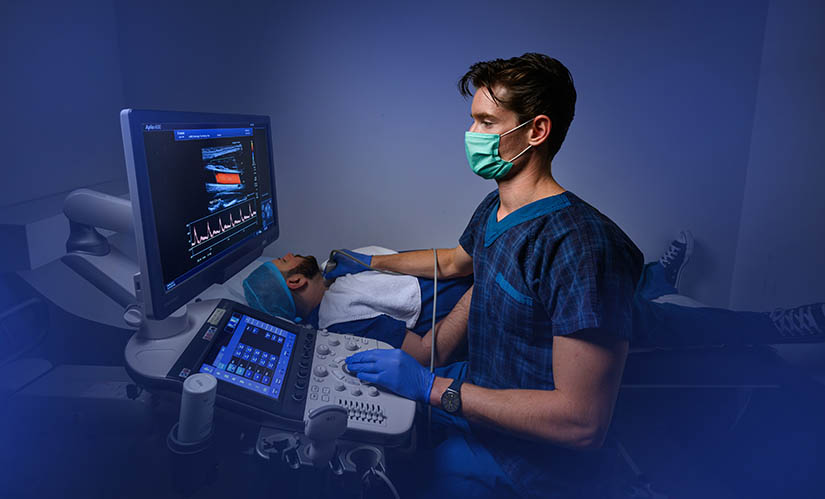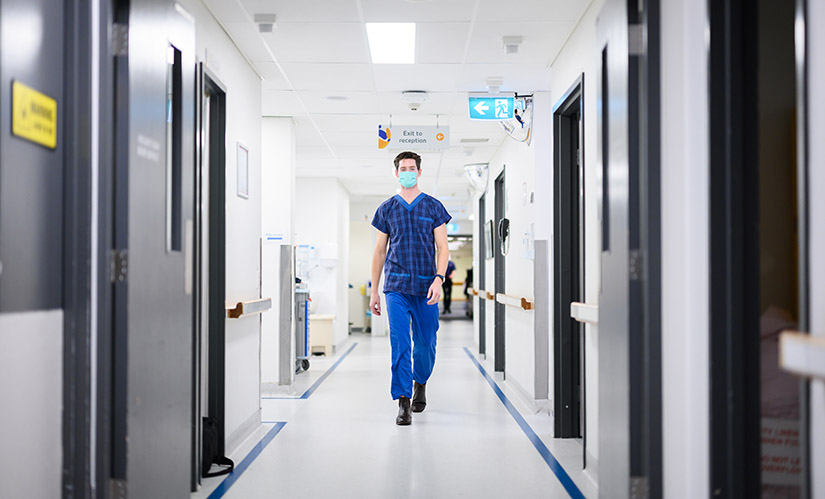
Charles Hall, 19 September, 2022
Charles Hall shares his experiences of working as a sonographer
Why choose sonography?
A sonographer is a medical professional trained to acquire and interpret ultrasound images of the human body. We do this by using an ultrasound machine and transducer (like a camera) which is placed on the skin with gooey gel and produces a credit card thin slice image of the anatomy deep to it, wherever it is placed. It’s up to the sonographer to scan through the patient’s body and assess it, taking images to inform a diagnosis. The sonographer interprets the images on the screen and it is up to their skill and attention to find the answer to people’s clinical problems.
A sore wrist? The sonographer will use the ultrasound machine to scan through all of your muscles and tendons, ligaments, joints and nerves, etc. to find the cause. All of this is assessed by the sonographer and it is up to them at the time of the examination to make decisions on what information is relevant to pass onto the doctors.
I’ve always wanted to work as a highly skilled medical professional applying my knowledge to care for patients and influence the best health outcome. During my undergraduate studies in medical imaging I identified sonography as a career that would allow me to use accurate diagnostics to meaningfully improve the lives of others.

How do you become a sonographer?
Students entering this course must have already completed a Bachelor of Medical Imaging (or similar), and already be in a workplace offered traineeship; meaning the two-year duration of study can only be completed in parallel to two years of practical experience. The benefit of learning this way is that the theoretical components learnt at university can immediately be explored and implemented during day-to-day clinical practice. This allows for the best learning and retention of knowledge.
Why study sonography at QUT?
My workplace encourages its trainees to attended QUT for their postgraduate sonography qualification, because QUT is recognised in the profession as producing some of the best, most skilled graduates. I also completed my undergraduate studies at QUT, so I was reassured by the familiarity and quality of the education I’d receive.
In class our lecturers and tutors were always looking for ways to make learning enjoyable and interesting. The attention to making learning fun was palpable. Never before have I dressed up as an ovary and wandered around an anatomy lab completing a quiz at rapid pace on structures of the fetal brain in the hope to win a box of Favourites. My teachers ensured that dry, complex topics were transformed into engaging, practical learning experiences.
Another way QUT helped prepare me for a career in sonography by providing exposure to industry professionals regarded as the best in their field. Being near the individuals who in a sense ‘wrote the books’ (certainly wrote the journal articles) on ultrasound of paediatrics, obstetrics, or other, meant we had a direct line of contact to the best clinicians in the industry. They shared their most useful pearls of wisdom and I regularly call upon information and practical suggestions from those classes.

What’s it like working as a sonographer?
As a Sonographer you are at the core of diagnosis, it’s like being a detective and once you find the answer, the way forward through treatment can be determined. I find this work to be interesting and important, and incredibly satisfying.
If you are considering ultrasound as a career you are likely already a health professional with a fair idea of what sonography is. If you are seriously considering the degree, I would say; as a sonographer you are given the responsibility to make decisions which directly impact a patient’s diagnosis. Therefore it is important to be a caring and curious professional, to scan each person as you would scan yourself or a loved one. The difference could literally be life changing.
